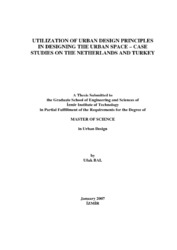Please use this identifier to cite or link to this item:
https://hdl.handle.net/11147/3746Full metadata record
| DC Field | Value | Language |
|---|---|---|
| dc.contributor.advisor | Serim, Muharrem Erkal | en |
| dc.contributor.author | Bal, Ufuk | - |
| dc.date.accessioned | 2014-07-22T13:52:16Z | - |
| dc.date.available | 2014-07-22T13:52:16Z | - |
| dc.date.issued | 2007 | en |
| dc.identifier.uri | http://hdl.handle.net/11147/3746 | - |
| dc.description | Thesis (Master)--Izmir Institute of Technology, City and Regional Planning, Izmir, 2007 | en |
| dc.description | Includes bibliographical references (leaves: 198-204) | en |
| dc.description | Text in English; Abstract: Turkish and English | en |
| dc.description | xiv, 204 leaves | en |
| dc.description.abstract | This thesis aims to develop a concept model as a tool for successful urban space design by defining general principles and therefore to stress the importance of defining and using these criteria when realizing projects. Moreover, the thesis research aims to provide concrete examples for designers to get to know how to integrate these principles practically into design and implementation process. In this framework, first the debate on the definition of urban design has been put forward. Then, the historical development of urban design has been presented in order to understand the past experiences and attempts in creating .successful. urban space. The principles of urban design, which are crucial to develop a key model for designing the urban space, have been defined. Furthermore, current policies and design control systems in different European countries have been examined. The historical development of urban design practice with contemporary examples from the Netherlands and Turkey have been examined. The thesis provides brief analysis on urban design projects with respect to urban design principles in seven headings, which constitutes the components of successful urban space: character, continuity and enclosure, quality of public realm, ease of movement, legibility, adaptability and diversity. In this context, urban design principles have been used to monitor the urban design projects from the Netherlands and Turkey with making comparative study between them. In this sense, selected projects have been evaluated and compared basing on how they fulfill the requirements that have been described with the above mentioned urban design principles, and more importantly, how they satisfy these principles in the process of designing the urban space. As a consequence, importance and necessity of urban design principles in order to create successful urban space and the importance of urban design for the future of the cities has been presented. | en |
| dc.language.iso | en | en_US |
| dc.publisher | Izmir Institute of Technology | en |
| dc.rights | info:eu-repo/semantics/openAccess | en_US |
| dc.subject.lcc | HT166. B17 2007 | en |
| dc.subject.lcsh | City planning | en |
| dc.subject.lcsh | City planning--Turkey | en |
| dc.subject.lcsh | City planning--Netherlands | en |
| dc.title | Utilization of urban design principles in designing the urban space case studies on the Netherlands and Turkey | en_US |
| dc.type | Master Thesis | en_US |
| dc.institutionauthor | Bal, Ufuk | - |
| dc.department | Thesis (Master)--İzmir Institute of Technology, City and Regional Planning | en_US |
| dc.relation.publicationcategory | Tez | en_US |
| item.fulltext | With Fulltext | - |
| item.cerifentitytype | Publications | - |
| item.openairetype | Master Thesis | - |
| item.openairecristype | http://purl.org/coar/resource_type/c_18cf | - |
| item.grantfulltext | open | - |
| item.languageiso639-1 | en | - |
| Appears in Collections: | Master Degree / Yüksek Lisans Tezleri | |
Files in This Item:
| File | Description | Size | Format | |
|---|---|---|---|---|
| T000602.pdf | MasterThesis | 39.88 MB | Adobe PDF |  View/Open |
CORE Recommender
Page view(s)
114
checked on May 6, 2024
Download(s)
162
checked on May 6, 2024
Google ScholarTM
Check
Items in GCRIS Repository are protected by copyright, with all rights reserved, unless otherwise indicated.